
“So, while HUD pats itself on the back for its good intentions, the affordable housing crisis expands every day, while manufactured housing production has dramatically declined over two consecutive quarters.” So said Mark Weiss, J.D., President and CEO of the Manufactured Housing Association for Regulatory Reform (MHARR) in his latest “Issues and Perspectives” released on 5.22.2023 but dubbed their June editorial installment. That “MHARR – Issues and Perspectives” entitled “HUD’s Failure on Zoning Equity Hurts Manufactured Housing Industry and Consumers” will be followed by additional information provided by MHProNews analysis and commentary that includes points not directly mentioned by Weiss.
- Part I – MHARR’s newest Issues and Perspective by President and CEO, Mark Weiss, J.D.
- Part II – Additional Information with More MHProNews Analysis and Commentary
- Part III – is our Daily Business News on MHProNews manufactured housing connected equities reports and U.S. macro market information. Those graphics provide market movement insights at a glance and are complemented by the left-leaning (CNN) and right-leading (Newsmax) headlines. Those headlines provide a convenient time saving summary of events that often influence or help ‘move the markets.’
MHProNews notes that the phrase “reaching the ground” which referred to MHARR’s 7.25.2022 White Paper in the MHARR Issues and Perspectives article is an expression used by National Weather Service (NWS) professionals. “Reaching the ground” is defined by those NWS government officials as: “Water or ice particles falling out of a cloud but evaporating before reaching the ground.” Merriam Webster has a similar definition: “wisps of precipitation evaporating before reaching the ground.” (Italics added in both examples for emphasis.)
With that introduction and added color, here is MHARR’s latest Issues and Perspectives. Highlighting in what follows is added by MHProNews.
Part I
MHARR – ISSUES AND PERSPECTIVES
By Mark Weiss
JUNE 2023
“HUD’s Failure on Zoning Equity Hurts Manufactured Housing Industry and Consumers”
Since the publication of MHARR’s July 2022 White Paper, entitled “The Exploitation of Federal Housing Finance and Mortgage Funding Assistance Programs and Potential Solutions,” industry members have requested further explanation and expansion of the White Paper’s principal findings. Those findings, specifically, were that discriminatory and exclusionary zoning, as well as a lack of competitive government-backed consumer financing, due to the non-implementation of the Duty to Serve Underserved Markets (DTS) within the dominant manufactured housing chattel lending market, prevent federal housing programs from “reaching the ground” for the benefit of manufactured housing consumers. Even more broadly, these factors have suppressed the long-term growth and evolution of the HUD Code industry including, but not limited to, growth that might otherwise have been driven by such public support. Thus, these principal factors not only prevent government programs and funding from reaching the ground for the manufactured housing industry and manufactured housing consumers but, worse yet, stifle any significant expansion of the HUD Code market as a whole.
In response to such inquiries, this column will be the first of a two-part “Issues and Perspectives” series to expand and further illustrate the White Paper’s findings. In this installment, we will further address the negative impacts of zoning discrimination and inequity, while the second part of the series will address the failure to implement DTS and resulting lack of fully-competitive consumer financing for HUD Code manufactured homes.
Turning to zoning inequity and its negative impact on the industry, consumers, and the availability and use of government affordable housing funding (and programs) within the HUD Code market, it is worth noting at the outset that for HUD, like most of the federal government these days, money is no object. Nor, apparently, are positive results. How else to explain the fact that HUD routinely shovels mountains of cash out the front door, while failing to remedy – or even make a dent in – the nation’s affordable housing crisis? While it doles out these bales of greenbacks, HUD could do a great deal more, at virtually no cost at all, to advance the utilization of a key affordable housing resource right under its nose – inherently affordable manufactured housing – but refuses to do so. Indeed, notwithstanding a specific legal obligation and matching congressional directive to advance manufactured housing – and directly-corresponding legal authority to override and nullify obstacles that stand in the way – HUD has failed to step-up for the benefit of millions of lower and moderate-income Americans in every corner of the United States. So, while HUD pats itself on the back for its good intentions, the affordable housing crisis expands every day, while manufactured housing production has dramatically declined over two consecutive quarters.
In a May 3, 2023 News Release, for example, HUD touted the “allocation” of $382 million to state government agencies to help them “produce affordable housing.” Among other things, HUD Secretary, Marcia Fudge, stated: “We’re proud to invest in states to create more affordable housing…. The Biden-Harris Administration is committed to improving the nation’s housing affordability crisis and the Housing Trust Fund provides communities resources they need to produce more safe, sustainable and affordable housing.” (Emphasis added). The News Release goes on to note that the Housing Trust Fund “is capitalized through contributions made by Fannie Mae and Freddie Mac (to be addressed further in the second part of this IP) and is designed to increase “production of and access to affordable housing for the nation’s most vulnerable populations.”
There are two problems, though, with the spending detailed by this News Release. First, “states,” per se – or any other unit or level of government for that matter – do not themselves “create” or “produce” affordable housing. It’s not as if those political entities had their own construction battalions. They may buy housing for various reasons and uses, but they do not “produce” housing in a physical sense, as that term is normally understood. Housing, rather, is produced almost entirely by (and within) the private sector and this, in turn, points to the second problem with the $362 million “allocation” to the states. And that is, quite simply, while the $362 million “allocated” to the states by HUD can be used for “real property acquisition,” there is no mention in the News Release of a manufactured housing component to this program, even though manufactured homes are directly – and comprehensively – regulated by HUD itself. HUD, therefore, is effectively doling out cash to supposedly finance the acquisition of “affordable housing” without: (1) providing a dime (at least directly) to the private sector entities that actually produce that housing; or (2) acting to ensure that the largess being distributed can be – and is – utilized to acquire genuinely affordable manufactured housing that, again, HUD itself regulates.
Effectively, then, this is yet another example of government spending on supposedly “affordable housing” that does not – and will not – “reach the ground” for HUD regulated manufactured housing or lower and moderate-income manufactured housing consumers, as was documented in MHARR’s July 2022 White Paper. This despite the fact that manufactured housing according to a 2010 HUD study, represents the best, most affordable housing value in the nation for lower and moderate-income Americans.
At the same time that HUD engages in galactic-level deficit spending, with little or nothing to show for it, it could advance the availability of truly affordable manufactured housing by simply enforcing a law that it is already required to uphold – i.e., the enhanced preemption provision of the Manufactured Housing Improvement Act of 2000.
This idea – and its underlying legal rationale – are very straightforward. It begins by recognizing that HUD’s statutory authority over – and responsibility for – the manufactured housing industry is quite broad. That’s why HUD’s regulations under the National Manufactured Housing Construction and Safety Standards Act of 1974 did – and still do – refer to HUD’s “superintendence” of the industry. That language was not an accident. It refers to HUD’s statutory obligation to advance the availability and accessibility of affordable HUD Code manufactured housing for all Americans as an essential affordable housing resource. And, just in case there was any doubt, when Congress updated the law in 2000, it explicitly emphasized that HUD’s mission with respect to manufactured housing involves more than mere “structural” regulation. Thus, in the “Purposes” section of the 2000 Reform Law, Congress stated that one of the key purposes of the law (and hence, HUD’s regulation of manufactured housing), was “to facilitate the availability of affordable manufactured homes and to increase homeownership for all Americans.”
Again, the word “facilitate” was not an accident. It was chosen to reflect an affirmative statutory obligation, on the part of HUD, to use all of the powers and authorities available to it, to advance the availability and utilization of HUD Code manufactured homes across all areas of the United States, among all groups and populations, and among all income levels.
So, the 1974 law, as augmented by the 2000 Reform Law, tasked HUD with a broad affordable housing role with respect to manufactured housing. But that role cannot be fulfilled if states and local jurisdictions can use their zoning authority to discriminatorily exclude HUD Code homes and simultaneously undermine housing equity. Consequently, Congress paired this broad affordable housing role with an amendment to the 1974 law’s federal preemption language, to make it clear that the scope of federal preemption under the Act as amended would be equally broad and up to the task of removing such baseless exclusions when and where needed. Congress, accordingly, extended the scope of federal preemption not just to state and local building standards, but to all state or local “requirements” affecting manufactured housing. Indeed, key sponsors and proponents of the 2000 law, made the connection between HUD’s expanded role and authority unmistakably clear in a 2003 letter to HUD, where they wrote, “the 2000 Act expressly provides, for the first time,” that federal preemption “be ‘broadly and liberally construed’ to ensure that local ‘requirements’ do not affect ‘federal superintendence of the manufactured housing industry.’” “These combined changes have given HUD the legal authority to preempt local requirements or restrictions which discriminate against the siting of manufactured homes….”
HUD, though, despite this enhancement of federal preemption, specifically to target discriminatory and exclusionary state and local zoning laws, has failed to use that authority even once in the ensuing nearly-quarter century, to invalidate zoning laws which prohibit or discriminatorily restrict the siting of manufactured homes and manufactured housing communities comprised of homes that HUD itself regulates.
Not to put too fine a point on it then, the reality is that today’s modern, affordable and energy efficient manufactured homes are the single best solution for the nation’s affordable housing crisis. Quite simply, in terms of both the substance of the home and affordability, there is no legitimate or valid basis for the exclusion of HUD Code homes from any compatible area of single-family housing anywhere. Yet, HUD Code homes routinely are excluded. Therefore, the only veiled, unspoken and unacknowledged reason for their exclusion (or other discrimination) is the fact that manufactured homes are built to a federal building code enforced by HUD, rather than a state or local building code enforced by the state or a local jurisdiction. HUD, though, clearly lacks the institutional fortitude to defend and assert the validity of its own building standards and code for manufactured homes.
All of this proves the validity of the central thesis of MHARR’s July 2022 White Paper>, which shows that federal affordable housing programs, grants, aid and other related federal benefits do not “reach the ground” with respect to manufactured housing or manufactured housing consumers, in large measure because state and local zoning and placement exclusions (and restrictions) on HUD Code homes undermine the utilization of such benefits. At the same time, these exclusions and restrictions prevent the HUD Code manufactured housing industry from reaching its full potential as an affordable housing resource for millions of Americans whose housing choices are being unlawfully restricted.
It is evident, then, that while HUD Code manufacturers can and do produce outstanding homes with any feature that buyers may seek, the national association which collects dues payments from the industry’s post-production sector has failed to take aggressive action to demand an end to discriminatory zoning exclusion and inequity that harms both the industry and millions of Americans in need of affordable housing. Most specifically, the Manufactured Housing Institute (MHI) has failed to demand that HUD select a case of overt zoning discrimination against HUD Code manufactured homes and pursue that case as far as necessary in the federal courts to ensure that the clear intent and objectives of Congress with respect to affordable manufactured housing are being fulfilled and not subverted. If HUD, though, continues to stall and deflect, as it has for far too long, there should be a specific (and speedy) legal challenge to HUD’s failure to act to fully implement the enhanced federal preemption of the 2000 Reform Law. ##
Mark Weiss
MHARR is a Washington, D.C.-based national trade association representing the views and interests of independent producers of federally-regulated manufactured housing.
“MHARR-Issues and Perspectives” is available for re-publication in full (i.e., without alteration or substantive modification) without further permission and with proper attribution and/or link back to MHARR. ###
Part II – Additional Information with More MHProNews Analysis and Commentary
- A point of refinement for the above is merited for the sake of clarity and precision. The late William “Bill” Matchneer, J.D., was the first administrator following the enactment of the MHIA role with the Office of Manufactured Housing Programs (OMHP). Well in advance of his death, Matchneer told MHProNews that while he (Matchneer) personally sent out some letters to public officials regarding federal preemption, that HUD’s Office General Counsel (OGC) – which ought to be the enforcement arm of that agency’s federal authority – declined enforcement of the Manufactured Housing Improvement Act (MHIA) enhanced preemption provision. That exclusive insight originated with this publication is apparently unchallenged. Neither MHI nor MHARR leaders at that time challenged Matchneer’s on the record remarks. More details on that are found linked below, including Matchneer’s precise statements. So, that explains how MHARR’s broad point that HUD’s OGC failed to enforce is accurate.
2. To further illustrate the observations in the first paragraph of Part II remarks, the following inquiry was put to Bing’s search and artificial intelligence (AI) chat functions on 5.22.2023. Bing was asked by MHProNews: “What did Bill Matchneer say about the enhanced preemption provision of the Manufactured housing Improvement Act of 2000?” The Bing search function provided this response (see screen capture linked here).
“Federal enhanced preemption was ‘one of the most important things in the whole statutory scheme’ that the Manufactured Housing Improvement Act (MHIA) enacted, said William ‘Bill’ Matchneer, J.D., former administrator of the Office of Manufactured Housing Programs (OMHP).” That was linked by Bing to the report below.
Bing’s AI chat function provided this reply to that same inquiry.

I hope this helps. Let me know if you have any other questions.
Learn more:
- fhfa.gov 2. manufacturedhomepronews.com 3. fox4kc.com 4. einpresswire.com 5. manufacturedhomepronews.com— see less”
3. Notice that the majority of responses on page 1 of the Bing search were reports linked to: MHProNews, media releases that included MHProNews, and a document on the FHFA website by this writer for MHProNews which cited MHARR, Matchneer, MHI, and others. Again, the screen capture that documents the Bing search result are shown at this link here.
4. Next, further undergirding the validity of MHARR’s concerns about the MHARR White Paper and results “not reaching the ground” for manufactured housing are remarks by HUD Secretary Marcia Fudge. See the video and related transcripts below and the Bing search and AI chat results linked here. To MHARR’s point that the Manufactured Housing Institute (MHI) needs to act on this post-production issue is supported by a CSPAN video and transcript, which are provided below along with additional information and MHProNews’ expert analysis and commentary. As Fudge said, ‘Until we start to address this we are going to continue to be perpetually in this kind of situation.’ After years of MHI with their “Got clout?” pitch supposedly lobbying HUD to get enhanced preemption enforced as CEO Lesli Gooch claims that they want, Fudge’s remarks ought to have signaled for MHI that they finally have to act legally to press HUD to act through the courts. Certainly, the method MHARR suggests is one avenue to pursue such litigation. There may be other legal avenues worth exploring too. Since MHI has claimed what amounts to a multipronged effort on the DOE energy rule, where is the parallel ‘multipronged effort’ from MHI on getting the MHIA’s enhanced preemption enforced?
5. With those thoughts in mind, note that almost two years have elapsed since MHI’s arguably misleading remarks to their own members and followers regarding the Congressional hearing in the report linked below. MHProNews has given MHI and their attorneys repeated opportunities to respond to such concerns. The evidence is clear that MHI leaders and attorneys have declined to engaged on substantive issues of concern and that has been documented several times in recent years. The most recent outreach by MHProNews to MHI was on 5.22.2023. Once again, with most of a business day having elapsed about a question on an issue that they ought to know is coming, MHI opted for silence. No response, which means that the prima facie case continues to be made that MHI is posturing rather than doing what the Arlington, VA based trade group has claimed to their members for years. As a fresh report linked here demonstrates, an attorney outside of manufactured housing recently informed MHProNews that when a patten of ongoing acts are involved (think MHI and their consolidation-minded brands), the statutes of limitations don’t expire until the commission of the final act. Note that the DOJ website apparently confirms that claim. As MHProNews exclusively reported in our analysis of the MHI email in their arguably deceptive and misleading ‘news and updates’ pitch to the industry which is provided in the report below, mindful that a deceptive email can be an element of a RICO violation of federal law.
6. The Bing search linked here and shown below provided the following top search result with this featured quotation. “More specifically, though, the addition of the word “requirements” in the preemption enhancement section of the 2000 law, broadens and extends HUD’s previous interpretation of the law, which limited preemption to the invalidation of differing state and local construction and safety standards applicable to “the same aspect” of manufactured home performance as a federal standard.” The bold text was in the original Bing response.
7. Recall that MHI publicly postured on “equity” for minorities and others when the Biden Administration regime took the reins in Washington, D.C. Note that in theory, MHProNews editorially concurred that the concept used by Gooch, i.e.: “advancing racial equity through manufactured housing” is a politically valid approach by MHI. That said, the practical problem with their actual approach, explained in the report below, was illustrated by the follow up report shown following this first linked flashback that includes MHI’s CEO Lesli Gooch’s own words.
8. Carefully reviewing the above report from 2021, MHProNews could predict what Gooch would do following that seemingly fine op-ed in National Mortgage News quoted in the report linked above. Namely, MHI did nothing practical that was noticeable publicly. Fine sounding words by Gooch were not followed by matching MHI deeds. More specifically, MHLivingNews initiated a test of Gooch’s and MHI’s sincerity. MHI’s CEO Gooch were given a specific opportunity to act on behalf of a black family in North Carolina. Gooch and MHI were asked to intervene by a town leader who is also black. The response? MHI’s Gooch gave him what amounted to a ‘be thou warmed and filled’ bit of nonsense. Per Ayden, N.C. Mayor Pro Team Ivory Mewborn, neither MHI nor Gooch further lifted a finger to weigh in on behalf of the very position that they postured in their op-ed by Gooch. Those factual and evidence-based elements noted, the report that follows is one more exclusive insight that MHI can’t easily dismiss or deny because the emailed remarks are documented. MHI could have deployed their own legal resources to act in Ayden, NC, perhaps in concert with their local state affiliate. They could also have chosen to do so in Bryan TX, or other opportunities. But instead of MHI acting as other nonprofits have in court against a local jurisdiction, Gooch only shared a few pretty sounding words to Rev. Mewborn but MHI reportedly did…nothing more. So, “MHI in Action” often appears to consistent of feel-good platitudes meant to deceive trusting manufactured housing industry independents and others who casually read MHI’s remarks vs. taking the common-sense and effective acts that actually lead toward achieving the goals they have claimed to support in writing. In as much as they have used the wires to do so, these purported acts of paltering, posturing, deception, and misdirection could be the subject of criminal as well as civil actions.

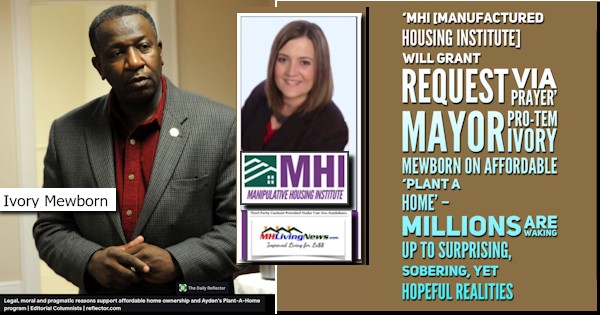
9. So, not only is the MHARR 2022 White Paper “vindicated,” as Weiss has asserted, but others from within manufactured housing and those without who have in recent years pointedly asserted that MHI says things that they do not mean to actually act upon. What is the purported rationale for MHI staff like Gooch to issue nice sounding words without doing the logical follow up in deeds? Consolidation. As industry independents get weary of the struggle to do what the MHIA asserted was lawful – enhanced preemption over local zoning – over 2 decades ago, some companies sell out, others simply fold. Either of those outcomes are workable outcomes for consolidation-minded firms who are routinely MHI and/or MHI state affiliate members. Some recent reports by publicly traded firms in their own words illustrate the disconnect between MHI’s words and their distinct corporate own words and deeds (see examples linked herein). Corporations that openly say they want to consolidate their segment of manufactured housing, and some have said that they are benefited by the constraints created by local officials. The conflicts of interest by numbers of MHI board members ought to be apparent, and the seemingly obvious violations of antitrust laws that may include elements of RICO and other violations are too.
10. Some years ago, MHProNews – based on a state association executive’s prompting – made the point that a good post-production or umbrella trade group has three functions. Protect. Educate. Promote. Or P.E.P. If MHI were doing any of their key roles justice, the industry ought to be growing in production and shipments. But instead, as Bing’s AI function recently remarked: “There are several reasons why the manufactured housing industry is underperforming. One reason is that many production chains were disrupted as a result of the novel coronavirus1. Another reason is that the other side is trying to systematically weaponize numbers of nonprofits to the disadvantage of manufactured housing so that they can consolidate the industry. That consolidation occurs at discounted valuations that result from avoidable underperformance2.” Bing AI chat function also said:

However, there are reasons to believe that manufactured housing could outperform the rest of the housing market in 2021. Rents are strong, and the industry’s demand is as high as ever3.
Manufactured homes are less expensive and of higher quality than in the 1990s and could help solve the affordable housing crisis. However, three reasons why manufactured housing production remains low are: home prices and rents outpacing family incomes, zoning/placement barriers, and finance-related challenges4.” There was much more documented in the report with expert analysis and commentary linked below.
One could go one with dozens of related examples. But perhaps using the one on an FHFA listening session webpage which was linked by Bing in response to an inquiry may provide one of the most useful summaries with hot linked evidence and examples in recent industry history. The AI result linked below is relatively succinct and insightful.
https://www.fhfa.gov/Media/Documents/Kovach-statement.pdf
The backstory to the above document is found in the follow up linked below.
MHI’s top staff and their corporate leadership have several apparent problems. The evidence of their obvious failures are supported by data and years of remarks like those by Weiss, MHARR, and others that ought to motivate MHI to act accordingly. But some MHI leaders continue to talk and posture without taking appropriate action.
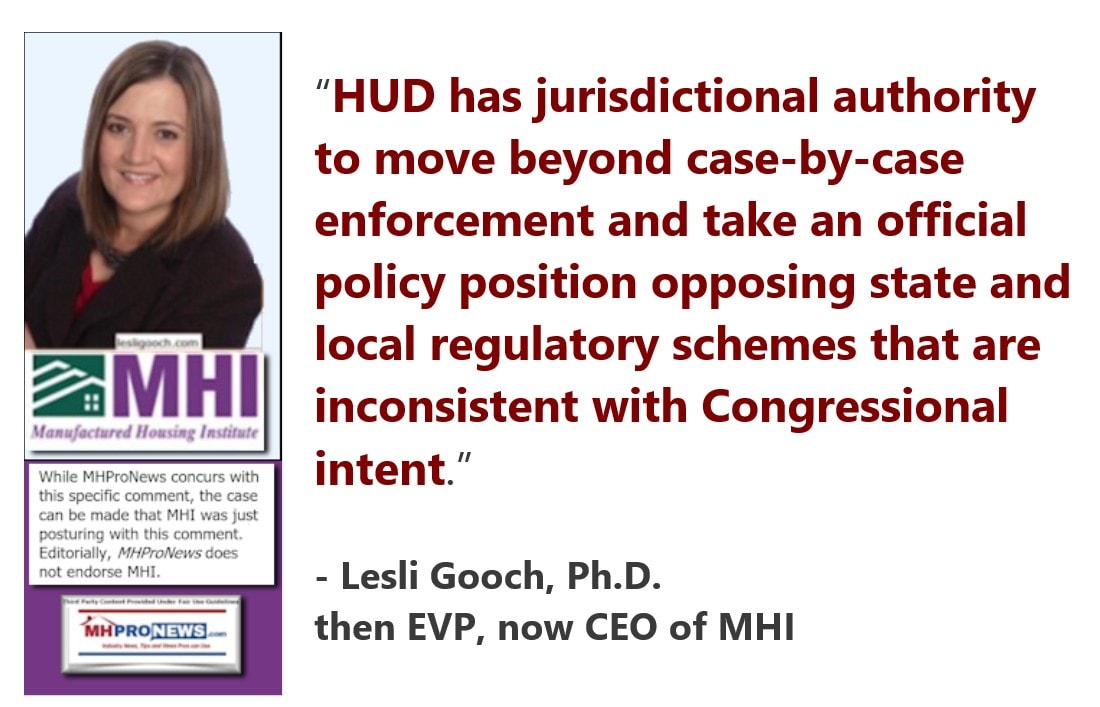
Bing’s AI identified Sameul Strommen’s thesis of “felony” antitrust violations as relevant to the underperformance of the manufactured housing industry. A different inquiry could demonstrate the point made by James A. “Jim” Schmitz Jr. and his Minneapolis Federal Reserve colleagues. Without denying that there are forces within the industry that are benefiting from this pattern, they point to HUD’s role and those of organizations such as the National Association of Home Builders (NAHB) in what they have called ‘sabotaging monopoly’ tactics.
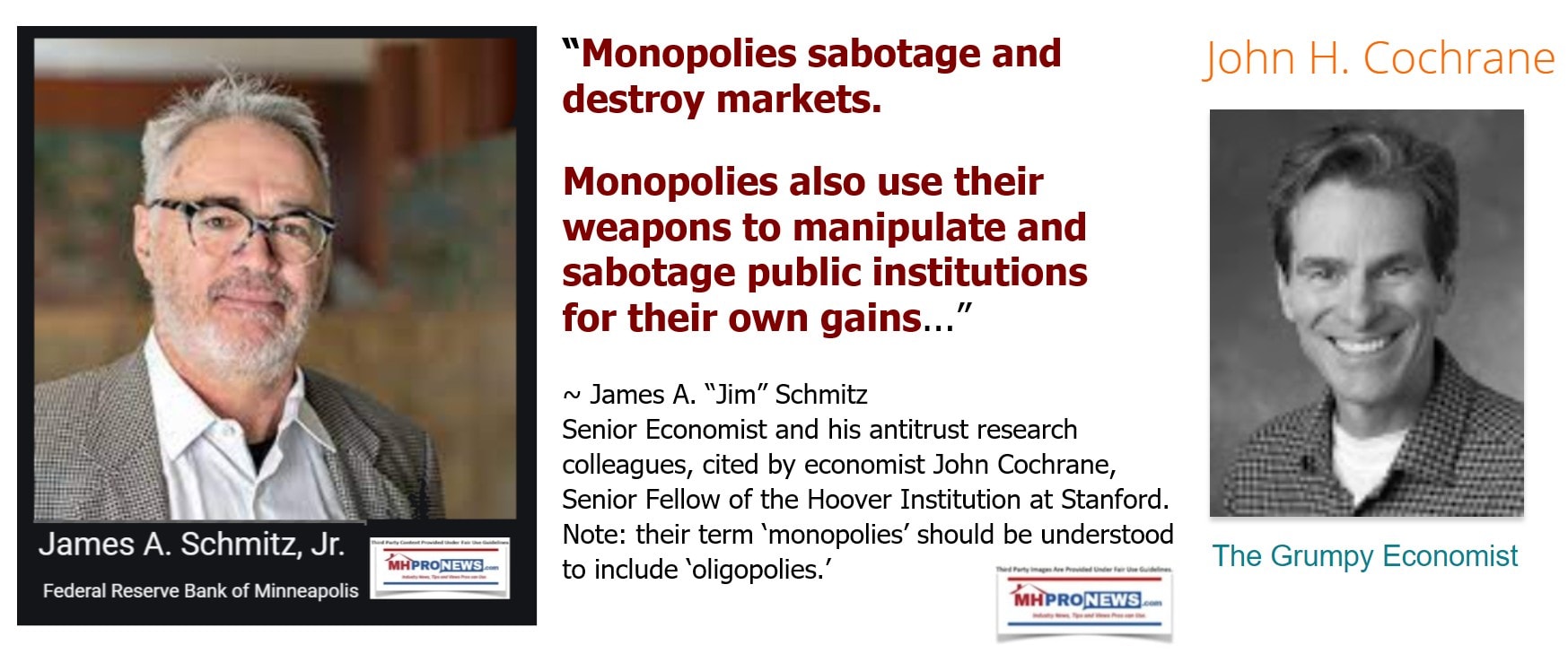
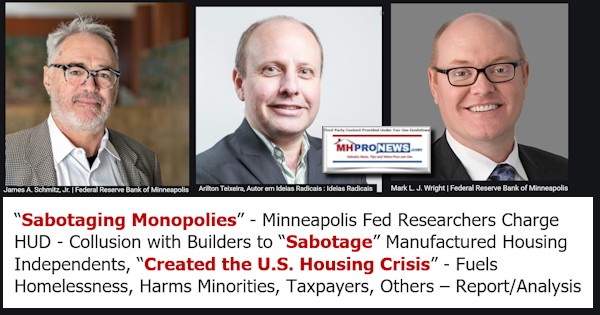
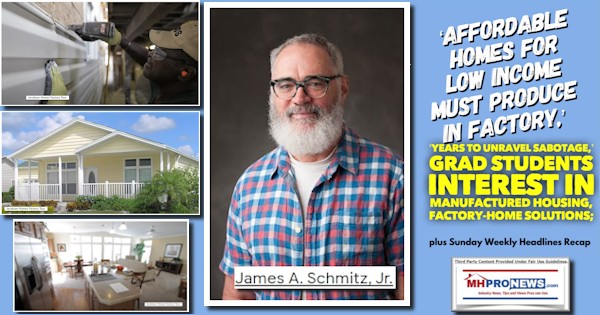
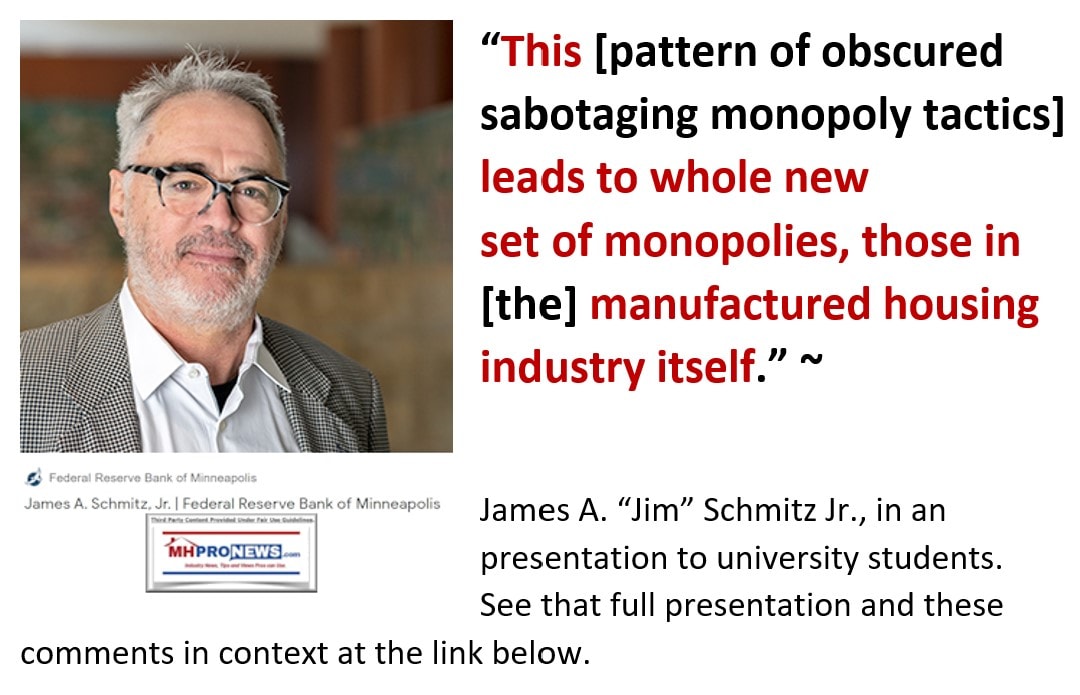
Year to date in 2023, several attorneys have published written research and remarks that de facto call into question MHI’s effectiveness and posturing. One of those was linked above and here, but some others are linked below.
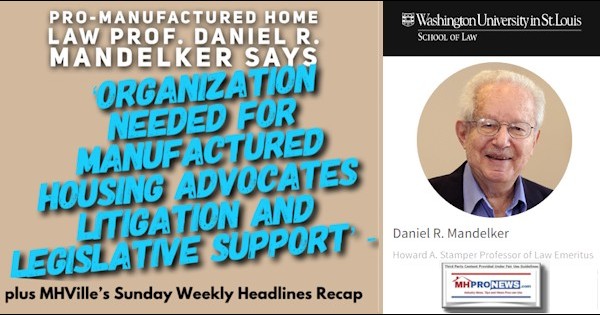
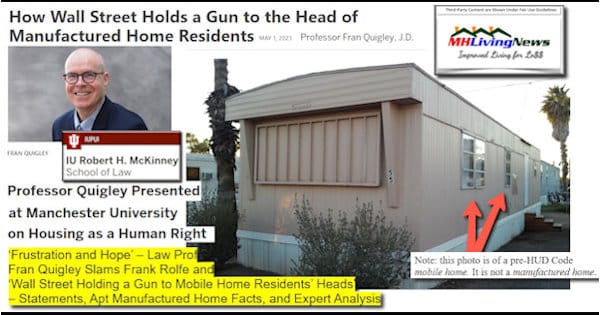
So, as Weiss argued in his June 2023 MHARR Issues and Perspective, both MHI and HUD are failing in their role. Ironically, when someone grasps the history of what has been occurring in manufactured housing in the 21st century, several members of prominent MHI brands have made that case too. So, once again, for those with attention to detail consider the various pieces of evidence, MHI has apparently supported the contention by Strommen and others that a steady oligopoly style of monopolization of the industry is underway that may escape the attention of regulators, even though some in mainstream media, among nonprofits, and members of Congress have raised similar concerns.
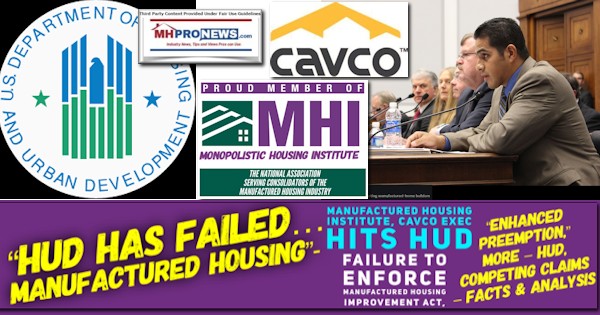
The MHBA Angle
In any complex issue, it is prudent to consider a range of sources and their respective assertions.
Modular home builders and manufactured housing are two distinct housing products, though both are factory built.
The Modular Home Builders Association (MBHA) Executive Director Tom Hardiman said early on in the Biden White House era that he spotted the telltale signs of what he called “political payoffs.” In a separate, but arguably related, concern, Hardiman faulted MHI for deceptive practices too. Specifically, Hardmian called out MHI for their CrossMods scheme, which MHARR has also criticized. Those items are linked below. When those puzzle pieces are lined up with Weiss’ contention for MHARR, shown above, the various pieces ‘fit’ the known facts. MHI has touted the Biden regime’s housing plan rhetoric, seemingly because it mentioned manufactured housing several times. It’s true that the Biden housing plan did mention housing numbers of times. But the point that MHARR has made is that like metaphorical vapors or tiny ice particles in a weather event, those vapors may not “reach the ground” because they evaporate first. Note that manufactured housing has plummeted in the wake of the Biden housing promises that happened to mention the manufactured housing industry. To pivot back to Hardiman’s contention, specific parties may benefit, but those are in his view ‘political payoffs.’ What has MHI said in the face of this pattern and related evidence? They are silent. They act as if the broader housing market slide is a driver, or too much inventory at retail centers. But if the points that MHARR has raised were properly addressed – zoning, finance, DOE, etc. – then logically there would be more sales, not fewer. There would be new factories opening. If a steady stream of new production was coming online, including from newcomers to MHVille, that would undermine the apparent stratagem of MHI connected consolidators using barriers of entry, persistence, and exit to keep the industry underperforming. Underperformance benefits self-declared consolidators. Underperformance is – in the view of key MHI players own corporate remarks – a de facto part of their plan. Underperformance can and has yielded more consolidation. But roaring performance makes that consolidation in an oligarchic monopolistic pattern difficult. The manufactured housing industry’s history, looking at the example of Fleetwood and Champion around the turn of the century, demonstrates that ‘buying’ market share while the industry is booming is difficult. The MHI board is in some ways a road map to industry collusion hiding in plain sight. The losers in the status quo? Numbers of independents, millions of affordable housing seekers, shareholders – who might benefit more if new communities and production came online, and taxpayers, who are being asked to fund $100 billion in HUD programs. Weiss pointed out in his evidence-based editorial above that manufactured housing could achieve much of the affordable housing crisis solutions with only tiny fraction of the levels of HUD financial support. HUD Code manufactured homes are a free market solution. In some apparent ways, Hardiman and Weiss are on a similar page though they are approaching the issue from their own unique perspectives. MHI may have created their ‘amen corner’ in manufactured housing, but the evidence stands against their behavior.
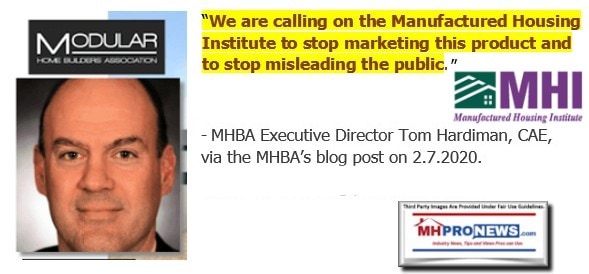

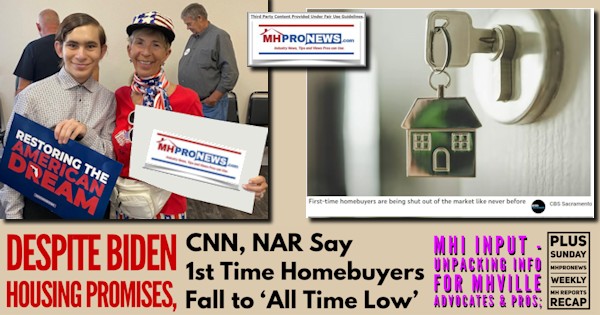

MHARR has asked Congress to investigate. It has been over a decade since Congress last held hearings on the Implementation of the Manufactured Housing Improvement Act of 2000. Others calls to investigate these apparent antitrust concerns have been brought to the attention of state and federal officials. If the proverbial squeaky wheel gets the grease, it may only be a question of time before some official(s), perhaps during a campaign, will decide to embrace the evidence and advance it in a robust fashion. After all, MHI’s own members have in several cases supplied the evidence that could be used against them. MHARR is simply and consistently nudging that process forward.
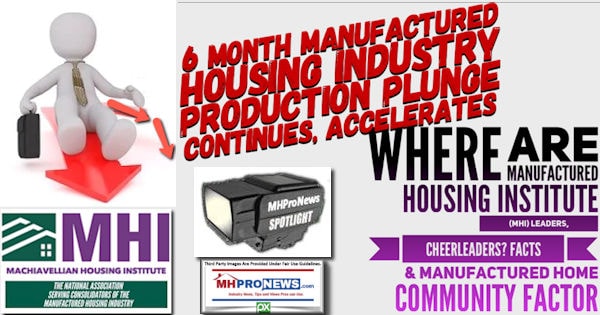
MHI arguably is an example that talk isn’t just cheap. Pretty sounding talk without the correct follow up can be costly to independents, shareholders, affordable housing seekers, taxpayers, and others that are sincere in their desire to solve the affordable housing crisis.

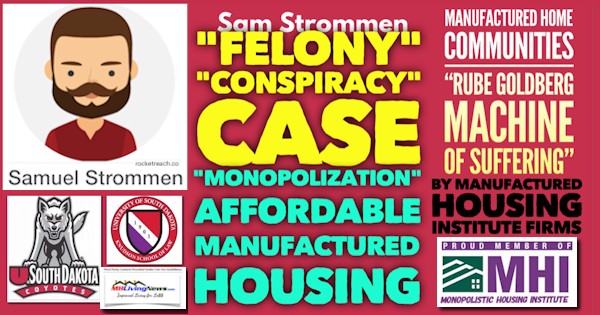
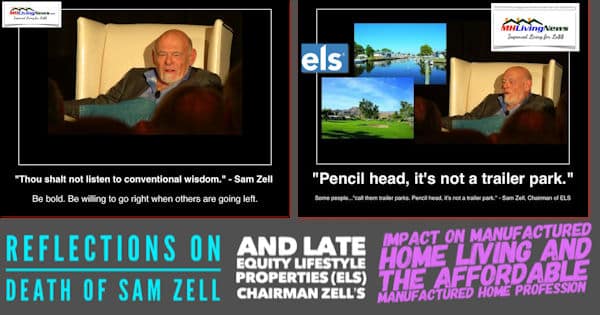

Part III – Daily Business News on MHProNews Markets and Headline News Segment
The modifications of our prior Daily Business News on MHProNews format of the recap of yesterday evening’s market report are provided below. It still includes our signature left (CNN Business) and right (Newsmax) ‘market moving’ headlines. The macro market moves graphics will provide context and comparisons for those invested in or tracking manufactured housing connected equities.
In minutes a day readers can get a good sense of significant or major events while keeping up with the trends that are impacting manufactured housing connected investing.
Reminder: several of the graphics on MHProNews can be opened into a larger size. For instance: click the image and follow the prompts in your browser or device to OPEN In a New Window. Then, in several browsers/devices you can click the image and increase the size. Use the ‘x out’ (close window) escape or back key to return.
Headlines from left-of-center CNN Business – from the evening of 5.22.2023
- Perhaps Wall Street should worry
- A trader on the floor at the New York Stock Exchange (NYSE) in New York during the opening bell on May 22, 2023. Wall Street stocks were mostly higher early Monday ahead of afternoon fiscal talks between President Joe Biden and Republican leaders to avert a US debt default.
- Why we may need a stock market plunge to solve the debt ceiling crisis
- China imposes sales restrictions on Micron as it escalates tech battle with Washington
- Verified Twitter accounts share fake image of ‘explosion’ near Pentagon, causing confusion
- Buy the dip? If the debt ceiling isn’t resolved soon, markets will likely slide
- More cash, fewer bonds: How corporate America can prepare for a US default
- Disney’s fight with DeSantis masks a bigger problem: Its business is struggling
- Meta slapped with record $1.3 billion EU fine over data privacy
- Debt ceiling woes could kill dealmaking on Wall Street
- ABC Australia apologizes to host as he steps away due to ‘sickening’ racist attacks
- Economists: US can weather ongoing crises, but recession remains on the table
- Blasting through the desert in Lamborghini’s new off-road supercar
- Janet Yellen reaffirms June 1 as hard deadline to raise the debt ceiling
- Everyone wants a foldable phone, but most of us can’t afford one yet
- Montana’s TikTok ban leaves users, business owners reeling
- Could the Fed raise rates again in June?
- This little-known rule shapes parking in America. Cities are reversing it
- American Airlines and JetBlue have to break up their partnership, court rules
- US cities with military bases risk economic damage in debt ceiling fight
- Looking for a side hustle? This company will pay you $100 an hour to watch TikTok for 10 hours. No cap
- Apple got rich in China. Other Asian markets offer the next ‘golden opportunity’
- How tornadoes, crypto and mudslides pushed up the debt default deadline
- Target recalls nearly 5 million candles after reports of cuts and severe burns
- Federal Reserve officials are growing skeptical about suspending rate hikes
Notice: the graphic below can be expanded to a larger size.
See the instructions below the graphic below or click the image and follow the prompts.
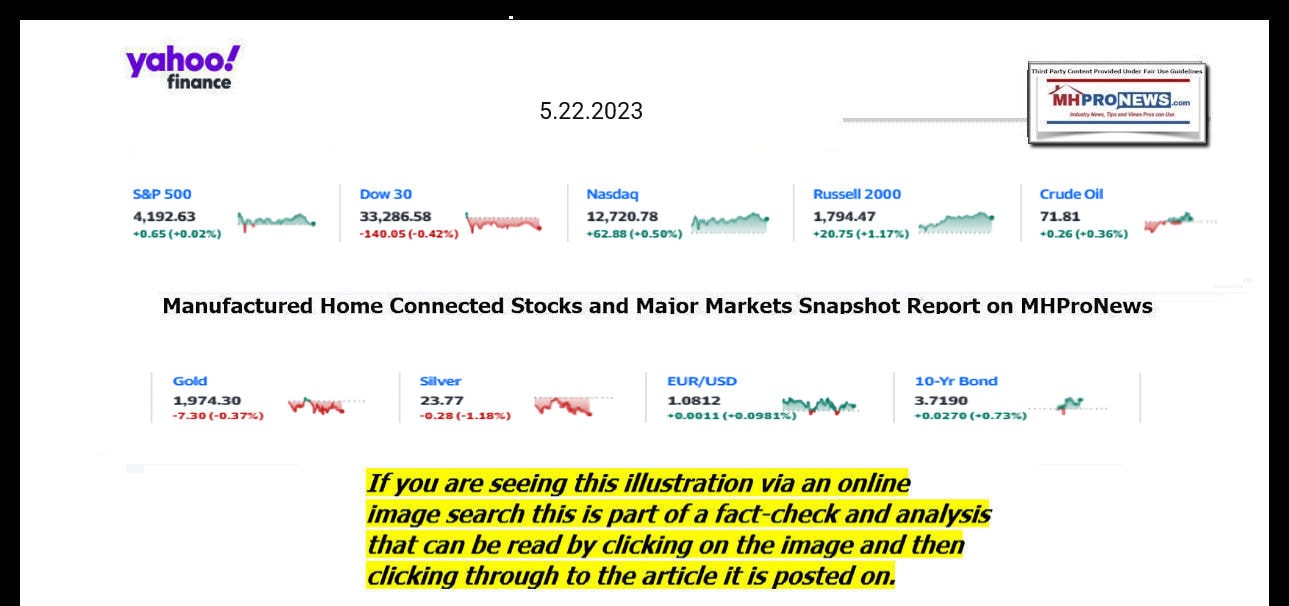
Headlines from right-of-center Newsmax 5.22.2023
- McCarthy: Latest Debt Ceiling Package Is ‘on the Right Path’
- Speaker of the House Kevin McCarthy, R-Calif., talks with reporters about the debt limit negotiations as he arrives at the Capitol on Monday. McCarthy and President Joe Biden are set to meet in the afternoon at the White House about raising the debt limit.
- LaTurner: Open Border ‘Ideological Nonsense’
- Kari Lake: ‘Considering’ Senate Run
- Marshall: GOP Won’t ‘Blink’ in Debt Talks | video
- Acosta: Biden Will Negotiate, ‘Cannot Afford’ to Default | video
- Former AG Whitaker: Congress Should Reform FBI | video
- Tenney: N.Y. Gov. Incentivizing Migrants | video
- Dick Morris: ‘Trump Is Developing a Real Cling’ | video
- Kerik: State, City Leaders Won’t Support NYPD | video
- Whitaker: ‘Not Convinced’ FBI Will Change Soon | video
- Newsfront
- FBI Director Wray to Testify Before House Panel in July
- The House Judiciary Committee is expected to question FBI Director Christopher Wray in mid-July, the Washington Examiner reported…. [Full Story]
- Biden Veto Looms on Move to Block Student Loan Debt Relief
- The White House on Monday said it will veto a joint congressional [Full Story]
- Tim Scott Launches ’24 Campaign: ‘I Cannot Stand By’
- Tim Scott, R-S.C., officially announced his 2024 presidential [Full Story]
- Related
- Trump Wishes Tim Scott Well in Race
- Tim Scott: America Not a ‘Racist Country’ |video
- Thune Bucks Trump, Endorses Sen. Scott
- Bongino: Fox Firing Tucker ‘Enormous Catastrophic Mistake’
- Former Fox News host Dan Bongino says the firing of Tucker Carlson [Full Story]
- Netanyahu Responds to Criticism Over Proposed Budget
- In a special Sunday Cabinet meeting held at the Western Wall Tunnels [Full Story]
- Ukraine Says It Advances to Surround Russians in Bakhmut
- Ukraine said its forces north and south of Bakhmut were advancing on [Full Story]
- Russia’s Claimed Bakhmut Win Is Anything But: Experts
- Biden: Zelenskyy Promises Not to Use F-16s in Russia
- UN Watchdog: Ukrainian Nuclear Plant Loses Power Supply Again
- Ukraine Amb. Welcomes F-16 Pledges; Urges Patience on Counteroffensive
- GOP Official Offers Moving Costs for NAACP Chair
- The chairman of the Florida Republican Party on Monday offered to help [Full Story]
- ‘This Is a Stunt’: DeSantis Denounces NAACP Attack on Florida Tourism
- Liberal NAACP Urges Travel Ban on Florida
- NAACP Chief Aims to Get Rid of DeSantis ‘Once and for All’
- Egg Prices Drop but Cost of Food Still High
- At times this year, it seemed consumers had to have a sizeable nest [Full Story] | Platinum Article
- Disney Dismisses Idea of Building Miniparks in US
- Walt Disney Co. Monday dismissed the idea of building miniparks in [Full Story]
- Deception Is Key to US Preparedness in the Pacific
- As Chinese belligerence increases in the Pacific and the U.S. and its [Full Story] | Platinum Article
- Pfizer Diabetes Drug Scores Weight Loss Like Ozempic
- Pfizer Inc.’s diabetes drug resulted in weight loss similar to that [Full Story]
- WH Prepares to Release National Antisemitism Strategy
- Following the White House celebration of Jewish American Heritage [Full Story]
- McCarthy: Latest Debt Ceiling Package Is ‘on the Right Path’
- House Speaker Kevin McCarthy said on Monday the debt ceiling package [Full Story]
- Bill Gates: Winner of AI Race Will Redefine Productivity
- Bill Gates, Microsoft Corp.’s co-founder, on Monday said the [Full Story]
- Amazon to Pilot Test Beer Purchases Without ID
- Amazon will trial run its One contactless purchase system at Coors [Full Story]
- FBI Probes Shooting Death of Arizona Man By Border Police
- The FBI is investigating the death of a tribal member after U.S. [Full Story]
- Another Death, More Vision Loss Linked to Eye Drops
- Cases of vision loss and deaths are mounting in an investigation into [Full Story]
- Taylor Swift Song Can Save Lives: American Heart Association
- Taylor Swift’s music could save lives. The American Heart Association [Full Story]
- Supreme Court Won’t Hear California Foie Gras Dispute
- The Supreme Court said Monday it won’t get involved in a dispute over [Full Story]
- Judge Enters Pleas for Suspect in U. Idaho Stabbing Deaths
- A judge entered not guilty pleas Monday for the man charged in the [Full Story]
- Biden to Nominate Democrat for Key FCC Seat
- President Joe Biden on Monday said he plans to nominate attorney Anna [Full Story]
- Poll: Belief in God Drops to Below Half in US
- Slightly less than half of Americans say they have no doubt that God [Full Story]
- Top GOP Picks for Down-Ticket Races Slow to Announce
- Republicans are pushing for top candidates to run in competitive [Full Story]
- DeSantis Hopes to Sway Older GOP Voters
- Florida Gov. Ron DeSantis appears intent on trying to make inroads [Full Story]
- Manchin Backs Radical Energy Nominee
- Joe Manchin, D-W.V., a critic of his party’s climate ideas, [Full Story]
- Paul Whelan ‘Confident’ US Will Secure Release
- American citizen Paul Whelan called CNN from the Russian prison in [Full Story]
- AP-NORC Poll: Biden Losing Ground on Key Issues
- As President Joe Biden embarks on his reelection campaign, just 33% [Full Story]
- Biden, McCarthy to Hold Pivotal Meeting on Debt Ceiling
- President Joe Biden and House Speaker Kevin McCarthy are set to meet [Full Story]
- Meta Hit With Record $1.3B EU Privacy Fine
- Meta was hit with a record 1.2 billion euro ($1.3 billion) fine by [Full Story]
- Trump: FBI Offered Steele $1 Million to ‘Frame Me’
- Former President Donald Trump wrote on Truth Social that the FBI [Full Story]
- Warner CEO Heckled at BU Commencement Speech
- Warner Bros. Discovery CEO David Zaslav was met with angry chants of [Full Story]
- The Secret’s Out: Amazon is Now Charging to Return Items
- Bill Gates: Winner of AI Race Will Redefine Productivity
- Bill Gates, Microsoft Corp.’s co-founder, on Monday said the technology race to win is the development of the top artificially intelligent agent, poised to disrupt search-engine, productivity and online shopping sites…. [Full Story]
- OpenAI Exploring Wikipedia-Type AI Oversight
- Walmart Forays Into Pet Telehealth With Pawp Tie-Up
- Craig Shirley: Let Dems Fund Reparations, Not the Rest of Us
- Troubled PacWest Sells $2.6 Billion Loans at Discount
- More Finance
- Health
- Signs You Are Fighting Chronic Inflammation
- Some inflammation in your body is good. It’s a sign that your body is trying to heal itself. Symptoms of redness, warmth, swelling and pain that are short-lived mean that your immune system is activating and sending inflammatory chemicals to the wound or injured site to…… [Full Story]
- 1 in 5 Seniors Now Ration or Skip Meds Due to Cost
- Walmart Forays Into Pet Telehealth With Pawp Tie-Up
- Scientists Identify Brain Signals of Chronic Pain
- WHO: Countries Must Prepare for Next Pandemic Now
Notice: the graphic below can be expanded to a larger size.
See the instructions below the graphic below or click the image and follow the prompts.
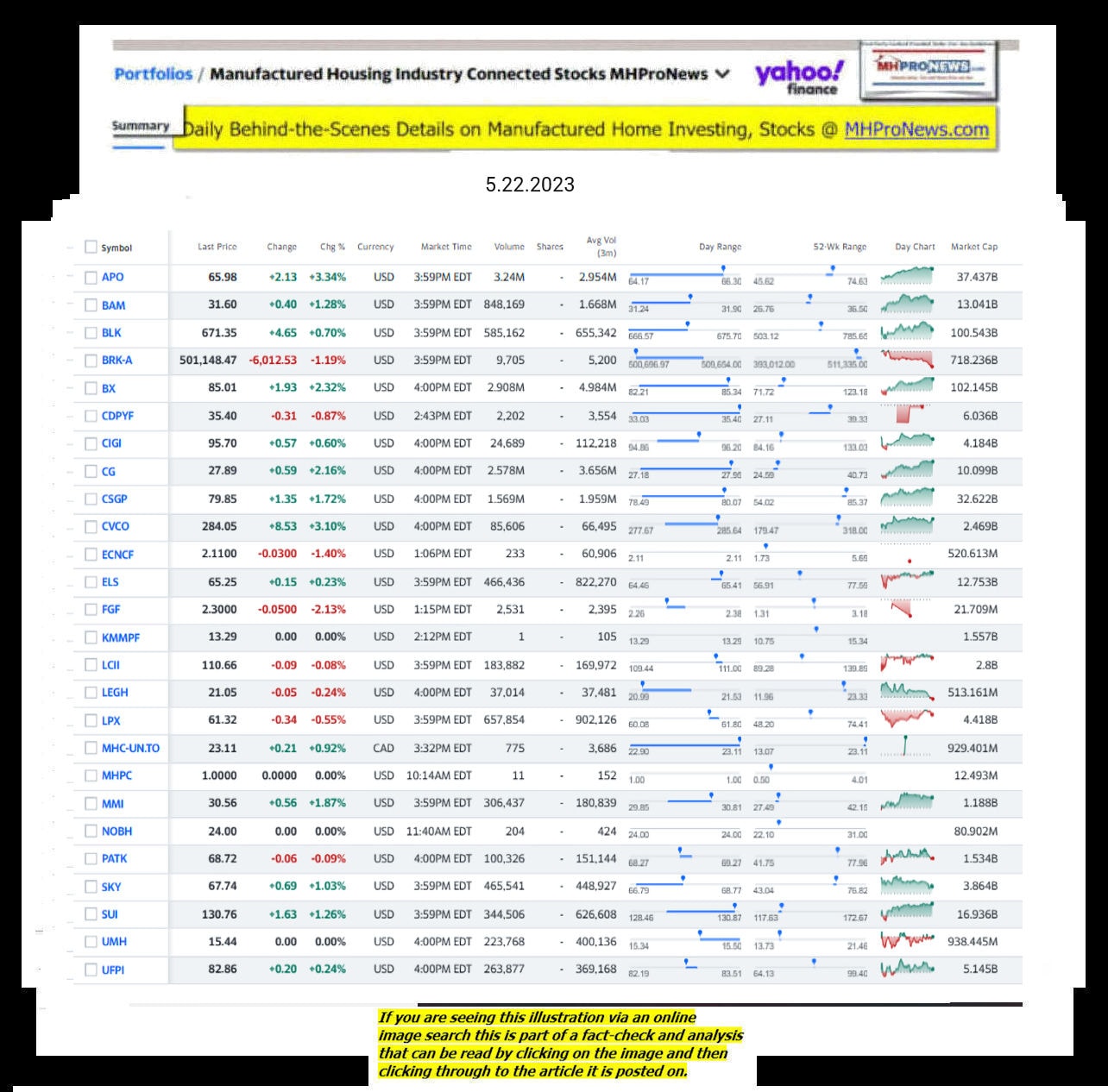
2022 was a tough year for many stocks. Unfortunately, that pattern held true for manufactured home industry (MHVille) connected stocks too.
See the facts, linked below.
====================================
Updated
-
-
- NOTE 1: The 3rd chart above of manufactured housing connected equities includes the Canadian stock, ECN, which purchased Triad Financial Services, a manufactured home industry finance lender.
- NOTE 2: Drew changed its name and trading symbol at the end of 2016 to Lippert (LCII).
- NOTE 3: Deer Valley was largely taken private, say company insiders in a message to MHProNews on 12.15.2020, but there are still some outstanding shares of the stock from the days when it was a publicly traded firm. Thus, there is still periodic activity on DVLY.
- Note 4: some recent or related reports to the REITs, stocks, and other equities named above follow in the reports linked below.
-
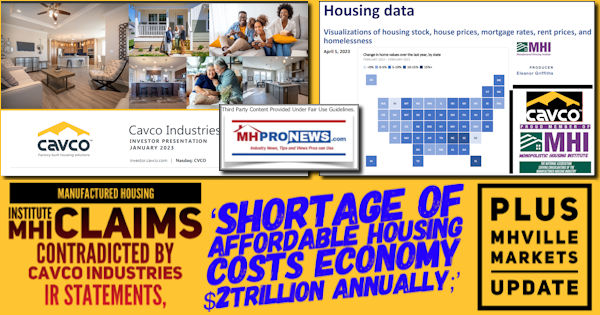

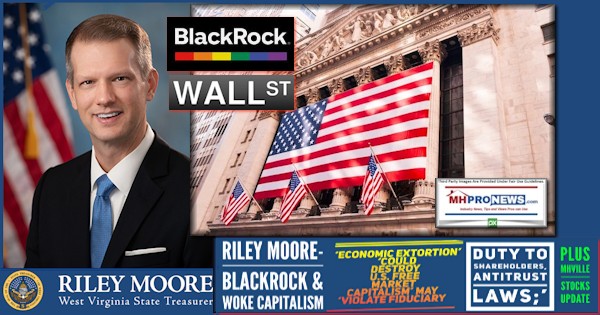

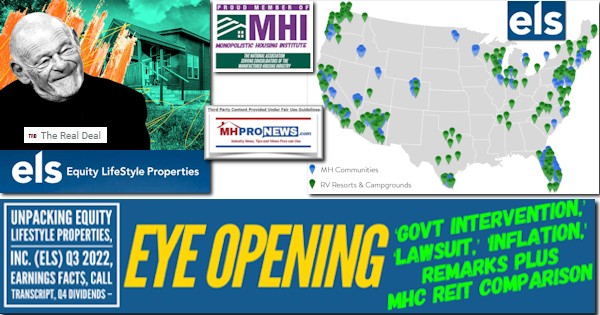

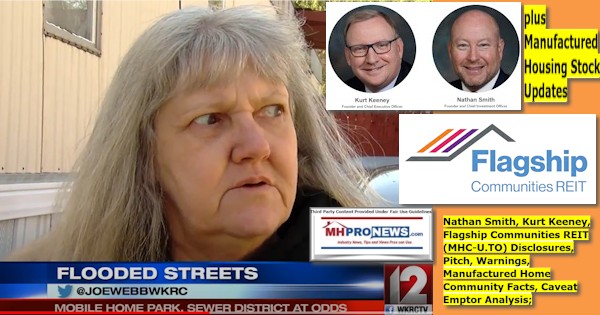

2023 …Berkshire Hathaway is the parent company to Clayton Homes, 21st Mortgage, Vanderbilt Mortgage and other factory-built housing industry suppliers.
· LCI Industries, Patrick, UFPI, and LP each are suppliers to the manufactured housing industry, among others.
· AMG, CG, and TAVFX have investments in manufactured housing related businesses. For insights from third-parties and clients about our publisher, click here.
Disclosure. MHProNews holds no positions in the stocks in this report.
· For expert manufactured housing business development or other professional services, click here.
· To sign up in seconds for our industry leading emailed headline news updates, click here.
- Manufactured housing, production, factories, retail, dealers, manufactured home, communities, passive mobile home park investing, suppliers, brokers, finance, financial services, macro-markets, manufactured housing stocks, Manufactured Home Communities Real Estate Investment Trusts, MHC REITs.


That’s a wrap on this installment of “News Through the Lens of Manufactured Homes and Factory-Built Housing” © where “We Provide, You Decide.” © (Affordable housing, manufactured homes, stock, investing, data, metrics, reports, fact-checks, analysis, and commentary. Third-party images or content are provided under fair use guidelines for media.) (See Related Reports, further below. Text/image boxes often are hot-linked to other reports that can be access by clicking on them.)

By L.A. “Tony” Kovach – for MHProNews.
Tony earned a journalism scholarship along with numerous awards in history. There have been several awards and honors and also recognition in manufactured housing. For example, he earned the prestigious Lottinville Award in history from the University of Oklahoma, where he studied history and business management. He’s a managing member and co-founder of LifeStyle Factory Homes, LLC, the parent company to MHProNews, and MHLivingNews.com. This article reflects the LLC’s and/or the writer’s position and may or may not reflect the views of sponsors or supporters.

























